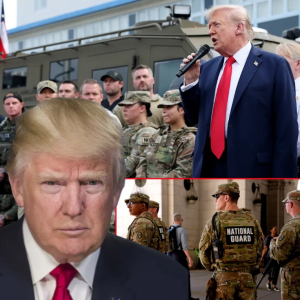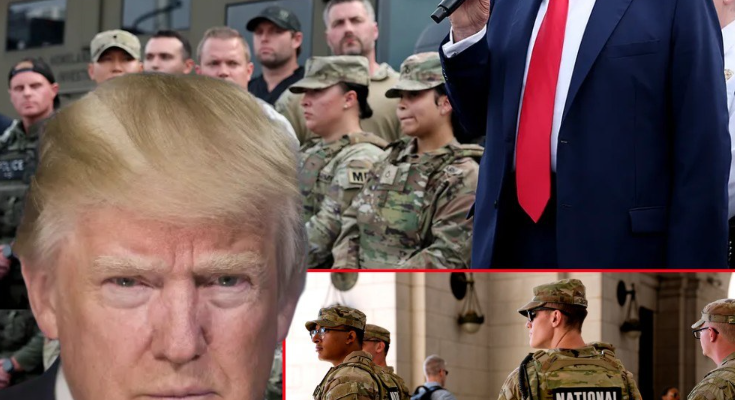
In a move that has reignited fierce debate over federal intervention in local law enforcement, President Donald Trump has ordered the deployment of the National Guard and federal agencies—including the FBI, DEA, ICE, and U.S. Marshals—to Memphis, Tennessee, as part of a sweeping new crime crackdown. The announcement, made from the Oval Office with Tennessee Governor Bill Lee and other Republican officials present, marks a dramatic escalation in Trump’s urban crime strategy and a test of presidential power in American cities.
🚨 The Memphis Surge: A “Replica” of D.C.
Trump described the Memphis operation as a “replica of our extraordinarily successful efforts” in Washington, D.C., where federal troops and agents were deployed earlier this year. The Memphis Safe Task Force, modeled after the D.C. initiative, will coordinate efforts between federal and state law enforcement to target violent crime, drug trafficking, and gang activity.
“We’re sending in the big force now,” Trump declared. “We’re not going to let this savagery destroy our country any more.” He emphasized that the task force would use “the full power of federal law enforcement” to restore safety and order.
📉 Crime Stats vs. Political Narrative
The timing of the crackdown has raised eyebrows. While the White House cited Memphis’s high crime rate—claiming it had increased since last year—local police data tells a different story. According to the Memphis Police Department, overall crime in the city is at a 25-year low, and murders have dropped to a six-year low in 2025.
Still, Memphis has long struggled with gun violence. In 2023, the city recorded over 390 homicides, setting a grim record. Trump’s administration argues that despite recent improvements, the city remains “high on too many bad lists,” and federal intervention is necessary to sustain progress.
🏛️ Political Tensions and Pushback
The decision has sparked political tension, especially with Memphis Mayor Paul Young, a Democrat, who said he was “certainly not happy” about the deployment. “I did not ask for the National Guard, and I don’t think it’s the way to drive down crime,” Young stated at a press conference.
Governor Bill Lee, on the other hand, welcomed the move. “I’m tired of crime holding the great city of Memphis back,” he said, aligning himself with Trump’s aggressive approach. Tennessee Senators Marsha Blackburn and Bill Hagerty also voiced support, joining the president during the announcement.
This partisan divide echoes similar clashes in other cities where Trump has proposed federal crackdowns, including Los Angeles, Chicago, and New York. In Memphis, the deployment is particularly sensitive given the city’s majority-Black population and history of strained police-community relations.
🧠 The Federal Strategy: Surveillance and Enforcement
The memorandum signed by Trump outlines a multi-agency strategy that includes increased surveillance, intelligence gathering, and coordinated raids. The FBI has already ramped up its presence in Memphis, and additional agents are expected to arrive in the coming weeks.
The plan also allows for out-of-state reinforcements, including National Guard units from Mississippi and Arkansas. Trump hinted that similar operations could soon be launched in Chicago, St. Louis, and Baltimore, though no dates have been confirmed.
🧨 Legal and Constitutional Questions
Critics argue that Trump’s use of federal troops in domestic law enforcement raises serious constitutional concerns. The Posse Comitatus Act limits the use of military personnel in civilian law enforcement, and while National Guard units can be deployed under certain conditions, the legality of federalizing local police forces remains contested.
Civil liberties groups have warned that such deployments could lead to over-policing, racial profiling, and erosion of local autonomy. The ACLU has called for congressional oversight, and some lawmakers are demanding transparency about the scope and duration of the Memphis operation.
🫂 Community Reaction: Fear and Hope
In Memphis, reactions are mixed. Some residents welcome the increased security, hoping it will curb gun violence and drug activity. Others fear that the presence of federal troops will escalate tensions and lead to unnecessary confrontations.
Local activist groups have begun organizing town halls and community forums to discuss the implications of the crackdown. “We want safety, but not at the cost of our dignity,” said one organizer. “We’ve seen what happens when the federal government storms in without listening.”
🧭 Trump’s Broader Vision: “Saving Our Great Cities”
Trump’s rhetoric during the announcement was sweeping and emotional. “We’ve got to go and save our great cities,” he said. “We’re going to go big.” He framed the Memphis deployment as part of a larger mission to restore law and order across urban America.
This vision aligns with Trump’s campaign messaging, which emphasizes crime reduction, border security, and federal strength. By targeting cities with high crime rates, Trump is positioning himself as a defender of public safety—even as critics accuse him of political theater.
🪞 A Mirror Moment for America
The Memphis crackdown is more than a policy—it’s a mirror. It reflects the nation’s ongoing struggle with crime, race, federalism, and the balance between security and liberty. It asks hard questions: Who gets to define safety? Who holds the power to enforce it? And what happens when those answers collide?

